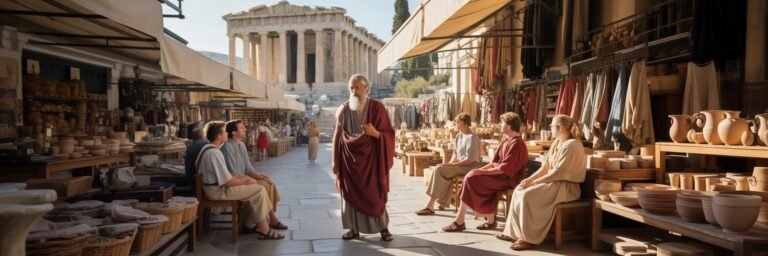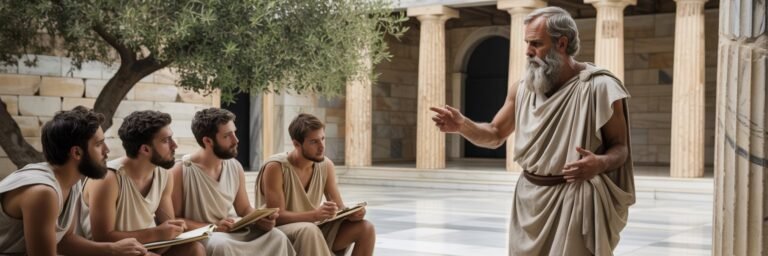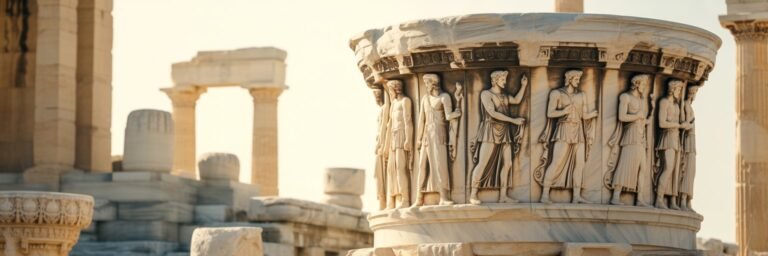INTRODUCTION
Classical Greece, a period marked by significant advancements in politics, philosophy, art, and science, left an indelible imprint on Western culture. Its quintessence lives on through its influential figures, ordinary mortals whose groundbreaking ideas and leadership laid the foundations of the world as we know it today. This era, often regarded as the Golden Age for Greece, made room for original thought and democratic ideals, a historical phenomenon that has shaped our worldview. As we venture into this exploration, we will take you through the canvass of time, intertwined in the lives of these influential individuals, lending us perspectives that time has often cloaked.
HISTORICAL BACKGROUND
Classical Greece was a period spanning between the 5th and 4th centuries BC, postdating the Archaic Greek Age and predating the Hellenistic period. Most scholars peg this period’s start to the end of the Greco-Persian wars in 480 BC and its end to the death of Alexander the Great in 323 BC. This period marked the height of the Greek city-states, most notably Athens and Sparta, whose intellectual, political, and military prowess became hallmarks of Greek civilization. The era witnessed the rise of democracy, the philosophical teachings of Socrates, Plato, and Aristotle, the construction of the Parthenon, and the deployment of strategic military formations such as the phalanx.
THEORIES AND INTERPRETATIONS
This period’s overarching narrative lies in the contest between the city-states, leading to the Peloponnesian War, the rise of the Macedonians and finally, the conquests of Alexander the Great. We find several interpretations regarding these events, their causes, and their implications on society and culture. Thucydides, who was the first historian to historically approach narrative construction, argued that the Peloponnesian War symbolised the tussle between authoritarian Sparta and democratic Athens and that the war stemmed from Spartan fear over the rising power of Athens.
In contrast, Aristotle and Plato described the Athenian democracy as a flawed and unstable system, prizing the philosopher’s rule over mob rule. Historian Plutarch’s interpretations permit us to perceive these figures beyond the spheres of politics and battles as people grappling with morality, ethics, foresight, and diligence.
MYSTERIES AND CONTROVERSIES
Several persistent historical controversies surround this period, centring around individuals and their actions. One is the trial and subsequent execution of Socrates, the father of Western philosophy. Though accused of impiety, it’s believed by some modern historians that his relationship with Alcibiades, a controversial political figure, may have contributed to his downfall.
Another greatly debated figure is Alexander the Great. Historians have been divided over deciphering his motivations – whether he intended to unite the world under one rule, or was he driven solely by his lust for power and battle? Moreover, the mysterious circumstances surrounding his death fuel more controversies, with theories ranging from poisoning to natural causes.
SYMBOLISM AND CULTURAL SIGNIFICANCE
The figures and events of Classical Greece held titanic cultural significance. The concept of democracy, the rule of the common man, was born in Athens and deeply interwoven with the philosophy of citizenship. The Spartan society was the symbol of military discipline and bravery, lessons that continue to inspire modern military scholars.
The philosophical teachings of Socrates, Plato, and Aristotle continue to shape our understanding of ethics, reality, and the purpose of human life. The conquests of Alexander inspire discussions on power, leadership, and ambition, while the war-filled narrative of the era serves as a stark reminder of the destructive power of conflict and imperial ambitions.
MODERN INVESTIGATIONS
Modern scholars continue to shed light on the intricacies of Classical Greece. Archaeological excavations reveal more details about architectural constructions, new findings on pottery shards shed light on ancient trade routes, while linguistic studies probe into the evolution of the Greek language during that era.
The digital era has ushered advances in historic research. Detailed textual analysis uncovers layers of meaning in ancient Greek texts. Sophisticated imaging techniques help reconstruct lost architectural wonders, while 3D modelling and virtual reality provide immersive experiences of their cities.
LEGACY AND CONCLUSION
The legacy of Classical Greece and its figures lives on. The Western world owes a great deal of its political, philosophical, artistic, and scientific roots to this era. The ideas seeded by these influential figures continue to dictate our thoughts and behaviours. The vision for a democratically ruled society, conceptualized in the heart of Athens, shaped our modern conception of governance. The philosophical discourses of Socrates, Plato, and Aristotle, challenge us to introspect and direct questions towards our existence, ethics, and the perception of reality.
The narrative of Classical Greece also perennially serves as a window, reflecting the follies of war and unrestrained ambition. As a civilization, we look back and learn, ensuring that those errors aren’t repeated, hoping to shape a future that balances the strides of progress with the wisdom of history. Thus, we conclude with a note of gratitude and understanding for our Classical Greek ancestors, whose influential figures continue to inspire and guide humanity.





